Caryn’s Thoughts
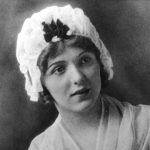 When we think of the Revolutionary war, or any other war, the people we think of are usually generals, presidents, and enemies, but in the case of the Revolutionary War, there is another name that is quite important. Her name was Betsy Ross. She became a patriotic icon in the late 19th century when stories surfaced that she had sewn the first “stars and stripes” US flag in 1776. Some say that story is doubtful, but Ross was known to have sewn flags during the Revolutionary War. Betsy was born Elizabeth Griscom on January 1, 1752, to Rebecca James Griscom and Samuel Griscom, who were both Quakers, living in the bustling colonial city of Philadelphia. As was often the case in those days, families were large, and Elizabeth was the eighth of seventeen children. Elizabeth came from generations of craftsman. Her father was a house carpenter. Elizabeth attended a Quaker school and was then apprenticed to William Webster, who was an upholsterer. In Webster’s workshop she learned to sew mattresses, chair covers and window blinds, but Betsy was a bit of a rebel, it seems. In the summer of 1773, when Betsy was 21 years old, she crossed the river to New Jersey to elope with John Ross, a fellow apprentice of Webster’s and the son of an Episcopal minister. This was a double act of defiance, and she was expelled from the Quaker church. The Rosses started their own upholstery shop, and John joined the militia. He died after barely two years of marriage. Family legend attributed John’s death to a gunpowder explosion, but illness is a more likely cause of death. Whatever the cause, Betsy found herself widowed, and exiled from her family, but Betsy was no quitter.
When we think of the Revolutionary war, or any other war, the people we think of are usually generals, presidents, and enemies, but in the case of the Revolutionary War, there is another name that is quite important. Her name was Betsy Ross. She became a patriotic icon in the late 19th century when stories surfaced that she had sewn the first “stars and stripes” US flag in 1776. Some say that story is doubtful, but Ross was known to have sewn flags during the Revolutionary War. Betsy was born Elizabeth Griscom on January 1, 1752, to Rebecca James Griscom and Samuel Griscom, who were both Quakers, living in the bustling colonial city of Philadelphia. As was often the case in those days, families were large, and Elizabeth was the eighth of seventeen children. Elizabeth came from generations of craftsman. Her father was a house carpenter. Elizabeth attended a Quaker school and was then apprenticed to William Webster, who was an upholsterer. In Webster’s workshop she learned to sew mattresses, chair covers and window blinds, but Betsy was a bit of a rebel, it seems. In the summer of 1773, when Betsy was 21 years old, she crossed the river to New Jersey to elope with John Ross, a fellow apprentice of Webster’s and the son of an Episcopal minister. This was a double act of defiance, and she was expelled from the Quaker church. The Rosses started their own upholstery shop, and John joined the militia. He died after barely two years of marriage. Family legend attributed John’s death to a gunpowder explosion, but illness is a more likely cause of death. Whatever the cause, Betsy found herself widowed, and exiled from her family, but Betsy was no quitter.
In the summer of 1776 or 1777, a widowed Betsy Ross received a visit from General George Washington regarding a design for a flag for the new nation. Washington and the Continental Congress had come up with the basic layout. Betsy allegedly finalized the design, arguing for stars with five points, instead of the six 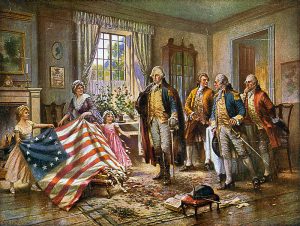 pointed stars that Washington had suggested, mainly because the cloth could be folded and cut out with a single snip. The tale of Washington’s visit to Ross was first made public in 1870, nearly a century later, by Betsy Ross’s grandson. However, the flag’s design was apparently not fixed until later than 1776 or 1777. Charles Wilson Peale’s 1779 painting of George Washington following the 1777 Battle of Princeton features a flag with six-pointed stars.
pointed stars that Washington had suggested, mainly because the cloth could be folded and cut out with a single snip. The tale of Washington’s visit to Ross was first made public in 1870, nearly a century later, by Betsy Ross’s grandson. However, the flag’s design was apparently not fixed until later than 1776 or 1777. Charles Wilson Peale’s 1779 painting of George Washington following the 1777 Battle of Princeton features a flag with six-pointed stars.
As I said, there has been some arguments as to the validity of Betsy Ross’ claim to fame as the flag’s maker, but most have been successfully disproven. Still, the fact that a painting was done with the six pointed stars is something to consider, or at least wonder about, not that I’m disputing her claim to fame. In fact, I have wondered if the painting was done that way, because of General Washington’s plan for the flag. I have also wondered why it was always said that Betsy Ross sewed the flag, because in June of 1777, Betsy remarried, to a man named Joseph Ashburn, who was a sailor. They went on to have two daughters. In 1782 Ashburn was apprehended while working as a privateer in the West Indies and died in a British prison. A year later, Betsy married John Claypoole, a man who had grown up with her in Philadelphia’s Quaker community and had been imprisoned in England with Ashburn. A few months after their wedding, the Treaty of Paris was signed, ending the Revolutionary War. They went on to have five daughters. Over the next decades, Betsy Claypoole and her daughters sewed upholstery and made flags, banners and standards for the new nation. In 1810 she made six 18 by 24 foot garrison flags to be sent to New Orleans. The next year she made 27 flags for the Indian Department. She spent her last decade in retirement, her vision failing. She died in 1836, at age 84.
The records of the US flag’s origins are not complete, in part because at that time Americans were indifferent to 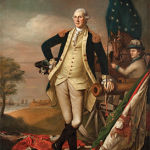 flags as national relics. “The Star-Spangled Banner” was written in 1812, but wasn’t popular until the 1840s. As the 1876 US Centennial approached, enthusiasm for the flag increased. In 1870, that Betsy Claypoole’s grandson William Canby presented the family story to the Historical Society of Pennsylvania. At the time several claims on the first flag were surfacing, ranging from other Philadelphia seamstresses to a New Hampshire quilting bee said to have fashioned the banner out of cut-up gowns. Most such stories were wishful desires to be symbols of female Revolutionary patriotism. To be women materially supporting their fighting men and, maybe to show George Washington a better way to make a star. Nevertheless, none of the stories ever took hold, except the one about Betsy Ross…or Ashburn…or Claypoole.
flags as national relics. “The Star-Spangled Banner” was written in 1812, but wasn’t popular until the 1840s. As the 1876 US Centennial approached, enthusiasm for the flag increased. In 1870, that Betsy Claypoole’s grandson William Canby presented the family story to the Historical Society of Pennsylvania. At the time several claims on the first flag were surfacing, ranging from other Philadelphia seamstresses to a New Hampshire quilting bee said to have fashioned the banner out of cut-up gowns. Most such stories were wishful desires to be symbols of female Revolutionary patriotism. To be women materially supporting their fighting men and, maybe to show George Washington a better way to make a star. Nevertheless, none of the stories ever took hold, except the one about Betsy Ross…or Ashburn…or Claypoole.
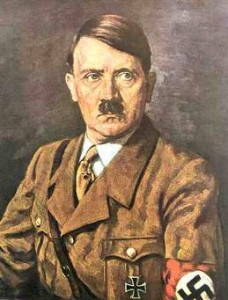 When we think of Nazi Germany, Hitler always comes to mind. We all know that he was an insane, murderous dictator, and that the people of Germany were afraid to stand up to him and his army. We know that he hated the Jewish people, even though he was part Jewish, and that later he also hated the gypsies. His hatred grew so strong that he enslaved and killed many thousands of these people, for no crime other than that they were Jewish or gypsies. During the years of Hitler’s reign, there were those who followed him because they agreed with him, those who just weren’t sure what they believed, and those who disagreed, but dared not oppose him. Children were often taken from their families and raised to be good Nazis. I’m sure this added to the number of people who agreed with Hitler, because it is a well know fact that children learn what they live.
When we think of Nazi Germany, Hitler always comes to mind. We all know that he was an insane, murderous dictator, and that the people of Germany were afraid to stand up to him and his army. We know that he hated the Jewish people, even though he was part Jewish, and that later he also hated the gypsies. His hatred grew so strong that he enslaved and killed many thousands of these people, for no crime other than that they were Jewish or gypsies. During the years of Hitler’s reign, there were those who followed him because they agreed with him, those who just weren’t sure what they believed, and those who disagreed, but dared not oppose him. Children were often taken from their families and raised to be good Nazis. I’m sure this added to the number of people who agreed with Hitler, because it is a well know fact that children learn what they live.
Nevertheless, while many people think that all the German people agreed with Hitler’s ways, but in reality, that was not the case. As World War II started to turn against the Germans, and Hitler’s atrocities grew, growing numbers of Germans, both military and civilian…began conspiring to assassinate their leader. It was assumed that the masses were unlikely to turn on the man in whose hands they had placed their lives and future. That said, they knew that it was up to men close to Hitler…German officers, to remove him. Leadership of the plot fell to Claus von Stauffenberg, newly promoted to colonel and chief of staff to the commander of the army reserve. His position gave him access to Hitler’s headquarters at Berchtesgaden and Rustenburg.
Stauffenberg had served in the German army since 1926. He was a staff officer in the campaign against the Soviet Union. He became disgusted at his fellow countrymen’s vicious treatment of Jews and Soviet prisoners. He requested to be transferred to North Africa, where he lost his left eye, right hand, and two fingers of his left hand. After recovering from his injuries, Stauffenberg became determined to see Hitler removed from power by 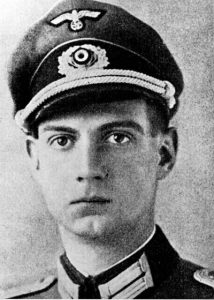 any means necessary. He traveled to Berchtesgaden on July 3 and met with a fellow army officer, Major General Helmuth Stieff, who gave him a bomb with a silent fuse that was small enough to be hidden in a briefcase. On July 11, 1944, Stauffenberg was summoned to Berchtesgaden to report to Hitler on the current military situation. He planned to use the bomb on July 15, but at the last minute, Hitler was called away to his headquarters at Rustenburg, in East Prussia. Stauffenberg was asked to follow him there. On July 16, a meeting took place between Stauffenberg and Colonel Caesar von Hofacker, who was another conspirator, in the Berlin suburb of Wannsee. Hofacker informed Stauffenberg that German defenses had collapsed at Normandy, and the tide had turned against them in the West. The assassination attempt was postponed until July 20, at Rustenburg. In the end, it wasn’t an assassin’s bomb that ended Hitler’s reign, but rather his own hands. Nevertheless, it wasn’t because the German people wanted him to continue to be their leader, because they definitely did not.
any means necessary. He traveled to Berchtesgaden on July 3 and met with a fellow army officer, Major General Helmuth Stieff, who gave him a bomb with a silent fuse that was small enough to be hidden in a briefcase. On July 11, 1944, Stauffenberg was summoned to Berchtesgaden to report to Hitler on the current military situation. He planned to use the bomb on July 15, but at the last minute, Hitler was called away to his headquarters at Rustenburg, in East Prussia. Stauffenberg was asked to follow him there. On July 16, a meeting took place between Stauffenberg and Colonel Caesar von Hofacker, who was another conspirator, in the Berlin suburb of Wannsee. Hofacker informed Stauffenberg that German defenses had collapsed at Normandy, and the tide had turned against them in the West. The assassination attempt was postponed until July 20, at Rustenburg. In the end, it wasn’t an assassin’s bomb that ended Hitler’s reign, but rather his own hands. Nevertheless, it wasn’t because the German people wanted him to continue to be their leader, because they definitely did not.

 I’m sure that most people have seen the movie, Twister. It is a personal favorite of mine. There is one line in the movie, where Aunt Meg said to Jo, that Bill always went his own way, which was usually the same way Jo was going. Well, I can’t say that Bob was going his own way, or that I was, but I can say that we were usually going in the same direction. Maybe that is the key to it, I don’t know, but I like that Bob and I like to do the same things. I never have to find a hiking partner, because Bob and I both love to hike. I don’t have to worry about a bowling partner, because we do it together. We both tend to like to be at home in the evenings…at least after that evening walk, and of course, we both love our family. I think the thing we most like to do though, is to be together. We are best friends, and I like that very much.
I’m sure that most people have seen the movie, Twister. It is a personal favorite of mine. There is one line in the movie, where Aunt Meg said to Jo, that Bill always went his own way, which was usually the same way Jo was going. Well, I can’t say that Bob was going his own way, or that I was, but I can say that we were usually going in the same direction. Maybe that is the key to it, I don’t know, but I like that Bob and I like to do the same things. I never have to find a hiking partner, because Bob and I both love to hike. I don’t have to worry about a bowling partner, because we do it together. We both tend to like to be at home in the evenings…at least after that evening walk, and of course, we both love our family. I think the thing we most like to do though, is to be together. We are best friends, and I like that very much.
Of course, there are a few things that Bob likes to do that I really don’t, such as mechanics. Bob is an excellent mechanic, and has spent the majority of his life working on cars. They say that if you do something you love, you’ll never work a day in your life. I think for Bob that is a true statement. He really loves mechanics…from the diagnostics to the dirt…he loves it all. I personally don’t want to be all greasy and dirty, but Bob just doesn’t seem to mind, and you just can’t spend much time under a car without getting grease and road dirt all over yourself. All I ask is that he doesn’t wear something that I care about, because after one car, any great shirt he is wearing is no longer very nice. Nevertheless, he sure does clean up nicely.
These days, Bob is trying to wrap his head around the fact that he has been retired for a full year. Of course, 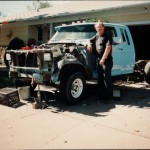
 he can’t really say that he is retired, because he is still doing the same work…just in a different location. Now he does all his mechanic work at home. I’m glad that he has that, because I think he would go stir crazy if he was just sitting around. Mechanics is what he loves, and I’m sure it is what he will always be doing. If I want him to myself, I still have to take him out of town, where he doesn’t have cars to work on. The good news is of course, I always know where to find Bob…out in the garage. Today is Bob’s birthday. Happy birthday sweetie!! Have a great day!! I love you!!
he can’t really say that he is retired, because he is still doing the same work…just in a different location. Now he does all his mechanic work at home. I’m glad that he has that, because I think he would go stir crazy if he was just sitting around. Mechanics is what he loves, and I’m sure it is what he will always be doing. If I want him to myself, I still have to take him out of town, where he doesn’t have cars to work on. The good news is of course, I always know where to find Bob…out in the garage. Today is Bob’s birthday. Happy birthday sweetie!! Have a great day!! I love you!!
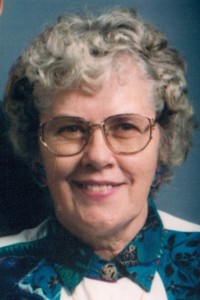 My aunt, Jeanette Byer is one tough lady. She has lived in the country for most of her life, and she is no stranger to hard work. In fact, I’m sure that is what has kept her young all these years. Aunt Jeanette is one lady who simply doesn’t know the word quit. She broke her leg one time, and she insisted that she could still do what she needed to do. So, with a crutch under one arm, and a weed-eater in the other hand, she proceeded to cut the weeds long the fence on their property. Aunt Jeanette simply would not let a little thing like a broken leg slow her down. She says, that she was raised in the country, and out there, you just do whatever you have to do…hard work and all. It was how you made a go of things in the country.
My aunt, Jeanette Byer is one tough lady. She has lived in the country for most of her life, and she is no stranger to hard work. In fact, I’m sure that is what has kept her young all these years. Aunt Jeanette is one lady who simply doesn’t know the word quit. She broke her leg one time, and she insisted that she could still do what she needed to do. So, with a crutch under one arm, and a weed-eater in the other hand, she proceeded to cut the weeds long the fence on their property. Aunt Jeanette simply would not let a little thing like a broken leg slow her down. She says, that she was raised in the country, and out there, you just do whatever you have to do…hard work and all. It was how you made a go of things in the country.
Aunt Jeanette’s sister-in-law, my aunt, Sandy Pattan told me something about Aunt Jeanette that is probably one of the nicest things I’ve ever heard said about a person. She said that Aunt Jeanette never had an unkind word to say about anybody. I was 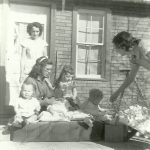 somewhat stunned about that. It wasn’t that I didn’t believe that about Aunt Jeanette, because I had no reason to doubt it. It was stunned because…seriously, how many people can honestly have that said about them, and yet there were several other people who said the same thing about Aunt Jeanette. She simply didn’t gossip, or say a harsh word about anyone. What an amazing tribute that is! I’ve thought about that statement since I first heard it.
somewhat stunned about that. It wasn’t that I didn’t believe that about Aunt Jeanette, because I had no reason to doubt it. It was stunned because…seriously, how many people can honestly have that said about them, and yet there were several other people who said the same thing about Aunt Jeanette. She simply didn’t gossip, or say a harsh word about anyone. What an amazing tribute that is! I’ve thought about that statement since I first heard it.
What kind of person literally never says an unkind word about anyone? This must be a very forgiving person. I 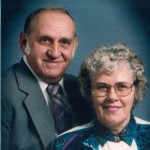 have known Aunt Jeanette all my life. She is a very sweet person, and I have always loved her very much. I can’t think of a time that I ever heard her say an unkind word about anyone. She has always been a fun person, and my husband, Bob and I have always enjoyed talking to her, and to her husband, my Uncle Larry, before his passing. Aunt Jeanette and Uncle Larry were always busy doing things. In fact, the place we often saw them was at Home Depot or Menard’s. They were always fixing something up. I think that is why Aunt Jeanette just never really aged. She stayed busy. Way to go Aunt Jeanette. Today is Aunt Jeanette’s birthday. Happy birthday Aunt Jeanette!! Have a great day!! We love you!!
have known Aunt Jeanette all my life. She is a very sweet person, and I have always loved her very much. I can’t think of a time that I ever heard her say an unkind word about anyone. She has always been a fun person, and my husband, Bob and I have always enjoyed talking to her, and to her husband, my Uncle Larry, before his passing. Aunt Jeanette and Uncle Larry were always busy doing things. In fact, the place we often saw them was at Home Depot or Menard’s. They were always fixing something up. I think that is why Aunt Jeanette just never really aged. She stayed busy. Way to go Aunt Jeanette. Today is Aunt Jeanette’s birthday. Happy birthday Aunt Jeanette!! Have a great day!! We love you!!

 My brother-in-law, Chris Hadlock has always loved the outdoors. In fact, for years, he my sister, Allyn and their family have gone camping during his birthday week. They usually go to Red Lodge, Montana, but this year he and Allyn did something a little different. This year, they went to Canada to spend the week in a houseboat, along with my sister, Caryl Reed and her husband, Mike; and my sister, Alena Stevens and her husband Mike. I know they are going to have a great time, and I can’t wait to see pictures of their trip. It’s such a unique kind of a trip, and I know they are all going to have a really great week. It will be a trip to remember, that’s for sure.
My brother-in-law, Chris Hadlock has always loved the outdoors. In fact, for years, he my sister, Allyn and their family have gone camping during his birthday week. They usually go to Red Lodge, Montana, but this year he and Allyn did something a little different. This year, they went to Canada to spend the week in a houseboat, along with my sister, Caryl Reed and her husband, Mike; and my sister, Alena Stevens and her husband Mike. I know they are going to have a great time, and I can’t wait to see pictures of their trip. It’s such a unique kind of a trip, and I know they are all going to have a really great week. It will be a trip to remember, that’s for sure.
This year seems to be shaping up to be one of change for Chris. He retired from the Casper Police Department on June 30th, after 27 years in law enforcement. During those yeas, he served the people of Casper and Natrona County capably and honorably. It has been a strange things for all of us to know that Chris is no longer a police officer. I also think that his retirement is a great loss to the Casper Police Department. Chris worked in so many areas of the department. He was a patrol officer for a number of years, then a supervisor and training officer. Later he hired new officers, and finally he was the supervisor of the detectives. His ability to do any job and do it well, is what made him such an asset to the department. Nevertheless, careers must come to an end sometime, and this was Chris’ time. I know that his new job will be a good career move too, and I am happy for him. Police work is stressful, and it’s time for him to de-stress.
Chris is rocking the career of grandpa too these days. He has three grandchildren so far, and they love to hang out with their grandpa. One of the things they really like to do is to listen to Chris play the guitar. He has been playing for most of his life, and I know his own kids loved to sit and listen to him play too. Now the next generation of kids are learning to love music from him as well. His youngest grandchild, Adelaide loves to help her grandpa play the guitar, and I’m sure the others did too. It is just so wonderful to be a grandparent. You aren’t the disciplinarian, and there is no pressure to be that. You just get to be to person they want to be with as 
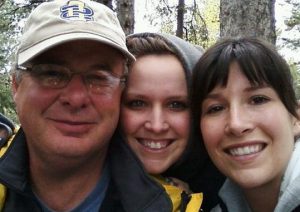 much as they can. They want to spend the night, and do the things you are doing, even if it’s work! If their grandparents are doing something, it must be the coolest thing in the world. There is just something about being a grandparent. It’s such an honor to watch the next generation of the sweet family you started, expanding to include these new little babies. That’s how Chris and Allyn are feeling now, and how they will feel far into the future. Today is Chris’ birthday. Happy birthday Chris!! Have a great day!! We love you!!
much as they can. They want to spend the night, and do the things you are doing, even if it’s work! If their grandparents are doing something, it must be the coolest thing in the world. There is just something about being a grandparent. It’s such an honor to watch the next generation of the sweet family you started, expanding to include these new little babies. That’s how Chris and Allyn are feeling now, and how they will feel far into the future. Today is Chris’ birthday. Happy birthday Chris!! Have a great day!! We love you!!
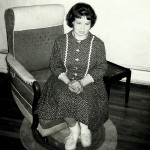
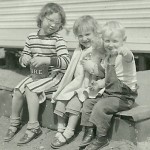 I first met my sister-in-law, Marlyce Schulenberg when I was 18 years old, and she was 23 years old. She passed away when she was 39 years old. It has been 28 years since Marlyce passed away in 1989, so she has been gone 13 years longer than she was in my life. While that fact feels like a fact in some ways, it doesn’t in others. Marlyce had such a huge impact on my life. It wasn’t anything specific that she did, but rather it was everything about my sweet sister-in-law. Marlyce was developmentally disabled, and in some ways she remained a child all her life, but in other ways, she was an adult. She had a job, and she loved to bake and knit, and really she didn’t play. She understood that kids games were for kids, and she was an adult. She would play games intended for grownups though. One of her favorites was solitaire. She always had a deck of cards handy.
I first met my sister-in-law, Marlyce Schulenberg when I was 18 years old, and she was 23 years old. She passed away when she was 39 years old. It has been 28 years since Marlyce passed away in 1989, so she has been gone 13 years longer than she was in my life. While that fact feels like a fact in some ways, it doesn’t in others. Marlyce had such a huge impact on my life. It wasn’t anything specific that she did, but rather it was everything about my sweet sister-in-law. Marlyce was developmentally disabled, and in some ways she remained a child all her life, but in other ways, she was an adult. She had a job, and she loved to bake and knit, and really she didn’t play. She understood that kids games were for kids, and she was an adult. She would play games intended for grownups though. One of her favorites was solitaire. She always had a deck of cards handy.
Still, it was not those things that made Marlyce so special to me. It was her personality. She was such a loving person. I suppose that I had an advantage over her siblings in that I was not her sibling. Coming into the family as an outsider, gave me the ability to be a friend to Marlyce before I became her sister-in-law. There never were the sibling rivalries or the sibling fights, because while Marlyce knew I was her sister-in-law, I don’t think she ever really thought of me that way, exactly. I was maybe more her permanent friend. Permanent in that I was a fixture within the family unit, and friend, in that I was not her blood sister. Of course, all of her siblings loved Marlyce too, but having grown up with her, they did all fight…like all siblings do.
One thing I recall about Marlyce that was kind of funny, is how protective she could be over her siblings. If she was mad at them…well, you knew it. She had no problem telling any one of them just what she thought, but if one of her siblings was getting into trouble…well, that was a different thing. I can’t tell you how many times I heard Marlyce telling her parents that they should be nice to her brother or sister. She was quite vocal about it. 
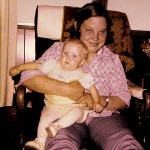 And even after the disciplinary action was over, she was still pretty mad at the offending parent. It was pretty comical, but I didn’t dare laugh about it, because Marlyce didn’t like being laughed at…and I would never hurt her feelings that way. Marlyce was so sweet. I couldn’t pick on her. When I think of all the years that Marlyce has been gone, I am saddened, because we are missing out on all the sweetness that was Marlyce. Everything about Marlyce was sweet, and I miss her very much. Today would have been Marlyce’s 67th birthday. Happy birthday in Heaven Marlyce. We love you very much.
And even after the disciplinary action was over, she was still pretty mad at the offending parent. It was pretty comical, but I didn’t dare laugh about it, because Marlyce didn’t like being laughed at…and I would never hurt her feelings that way. Marlyce was so sweet. I couldn’t pick on her. When I think of all the years that Marlyce has been gone, I am saddened, because we are missing out on all the sweetness that was Marlyce. Everything about Marlyce was sweet, and I miss her very much. Today would have been Marlyce’s 67th birthday. Happy birthday in Heaven Marlyce. We love you very much.
 Weather has always been a subject of interest to people, even if we still don’t completely have a full grasp of it, not even after all these years and all our technology. The main difference I see now is that we hear about weather all the time. It’s on television, the radio, and even our phones. There are warnings for everything…thunder storms, tornadoes, snow storms, flash floods, and hurricanes. Nevertheless, all the meteorologists can truly do is predict a weather event. It may or may not materialize.
Weather has always been a subject of interest to people, even if we still don’t completely have a full grasp of it, not even after all these years and all our technology. The main difference I see now is that we hear about weather all the time. It’s on television, the radio, and even our phones. There are warnings for everything…thunder storms, tornadoes, snow storms, flash floods, and hurricanes. Nevertheless, all the meteorologists can truly do is predict a weather event. It may or may not materialize.
Now, flash back to, oh say 1680 or even to 1521. Other than looking at the sky, how did the people predict the weather? Yes the sky can be a great predictor of coming storms, but unless you knew something about weather  patterns, you would be unlikely to have any idea that something like a tornado, flood, or hurricane were coming. Especially in 1680 or 1521. Those dates are rather important in the world of weather. In August of 1521, a meteorological phenomenon occurred in the Basin of Mexico. There were no cameras back them, no cell phones or computers to record the event. The only known description appears in Book XII of the Florentine Codex, which is an account of the Spanish conquest of Mexico written in Nahuatl in the mid-sixteenth century. The account states that just before the fall of Mexico-Tenochtitlan a heavy storm which included a whirlwind struck the basin. The whirlwind hovered for a while above Tlatelolco, Tenochtitlan’s twin city. Then it moved to the lake where it disappeared.
patterns, you would be unlikely to have any idea that something like a tornado, flood, or hurricane were coming. Especially in 1680 or 1521. Those dates are rather important in the world of weather. In August of 1521, a meteorological phenomenon occurred in the Basin of Mexico. There were no cameras back them, no cell phones or computers to record the event. The only known description appears in Book XII of the Florentine Codex, which is an account of the Spanish conquest of Mexico written in Nahuatl in the mid-sixteenth century. The account states that just before the fall of Mexico-Tenochtitlan a heavy storm which included a whirlwind struck the basin. The whirlwind hovered for a while above Tlatelolco, Tenochtitlan’s twin city. Then it moved to the lake where it disappeared.
When the experts of today look at the account of the phenomenon in the context of the Nahua culture, and  comparing it with European descriptions of tornados and waterspouts, they can determine that the phenomenon was indeed a tornado. Their conclusion is further supported by eighteenth and nineteenth century pictorial and written evidence showing that tornadoes do occur in the territory now occupied by Mexico City. Since the tornado of Tlatelolco predates the Cambridge, Massachusetts, tornado of July 8, 1680, which had been thought to be the first recorded tornado in the Americas, the Tlatelolco tornado actually represents the earliest documented tornado in the Americas. Either way, since people didn’t really have much information to go on back then, I’m sure they first said some version of “What is that?!!?” At least, I know I would have.
comparing it with European descriptions of tornados and waterspouts, they can determine that the phenomenon was indeed a tornado. Their conclusion is further supported by eighteenth and nineteenth century pictorial and written evidence showing that tornadoes do occur in the territory now occupied by Mexico City. Since the tornado of Tlatelolco predates the Cambridge, Massachusetts, tornado of July 8, 1680, which had been thought to be the first recorded tornado in the Americas, the Tlatelolco tornado actually represents the earliest documented tornado in the Americas. Either way, since people didn’t really have much information to go on back then, I’m sure they first said some version of “What is that?!!?” At least, I know I would have.

 My grandniece, Anna Masterson is her own person. She likes what she likes, and she doesn’t care if that makes her different. She doesn’t care if the things she is into are the popular things that others are into or not. If others don’t Ike what she likes…oh well. Anna is not bothered by her uniqueness…and neither am I.
My grandniece, Anna Masterson is her own person. She likes what she likes, and she doesn’t care if that makes her different. She doesn’t care if the things she is into are the popular things that others are into or not. If others don’t Ike what she likes…oh well. Anna is not bothered by her uniqueness…and neither am I.
Anna is a quiet girl, but she’s not a shy girl. People think she is shy, but she is a listener. Anna gets to know people and what they are all about before she dives into the conversation. She likes to “figure you out” as her mom, Dustie would say. Once she figures you out, she will let you into her world. Anna thinks before she speaks, and her mom says Anna tends to astound her with with her observations and thoughts. Anna is a realist. She has questions about a lot of things and she wants a real answer, not a sugar coated one intended to make her think the world is all soft and sweet. Anna loves to sit and watch documentaries with her mom. She doesn’t care what it’s about, just that it’s real. She’s very smart and her favorite subjects in school are Math and Science.
She loves God, family, and country, in that order. Her loyalty to all of those is second to none. Her cousin, Aleesia Spethman is like a little sister to her. They are both the youngest in their family, and they are just like sisters, complete with sibling rivalry and the fighting that goes along with it. Nevertheless, as annoyed as she may get with her younger cousin, She also councils her, comforts her and protects Aleesia even from Anna’s brother, Matthew who is Anna’s best friend. Sometimes, When Matthew is to much for Anna to handle alone, she pulls out the big guns, her big sister, Raelynn. These days, since Raelynn had to have back surgery, Anna is extremely protective of of her older sister too. If she hears her sister crying in the night from pain, she is the first one there to comfort her.

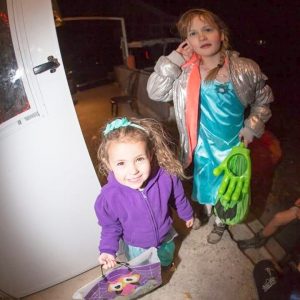 Anna has a bright future ahead of her, quite possibly in the area of science. Her close relationship with God will guide her to what he has planned for her. Her parents have no worries about this girl, who is very comfortable in her own skin. She does have a funny side too, though, and according to her mom, loves cheesy puns. One night, she and her mom were making pizza crust. When they were all done and went to wash their hands off, Anna said that they “had just gotten out of a very sticky situation.” Today is Anna’s 10th birthday. Happy birthday Anna!! Have a great day!! We love you!!
Anna has a bright future ahead of her, quite possibly in the area of science. Her close relationship with God will guide her to what he has planned for her. Her parents have no worries about this girl, who is very comfortable in her own skin. She does have a funny side too, though, and according to her mom, loves cheesy puns. One night, she and her mom were making pizza crust. When they were all done and went to wash their hands off, Anna said that they “had just gotten out of a very sticky situation.” Today is Anna’s 10th birthday. Happy birthday Anna!! Have a great day!! We love you!!
 I think we have all had times when we couldn’t seem to concentrate on our work. Or maybe you had a child who couldn’t concentrate on their homework. Well, in 1925, an inventor named Hugo Gernsback, a Luxembourgish-American inventor, writer, editor, and magazine publisher, invented a helmet to make sure a person focused on their work. It was called the Isolator, and it was…well, bizarre. Gernsback was often known as “The Father Of Science Fiction,” and one look at his invention can tell you why that might be. The Isolator was a wooden helmet that blocked out sound and vision in order to help the wearer focus on whatever task was at hand. Gernsback claimed that the helmet blocked out sound by up to 95%, and the tiny glass spy-hole ensured that no amount of movement nearby could be seen, so that the wearer was not distracted. This would eliminate all outside distractions, and barely give enough room for the wearer to see the work in front of them, and nothing else.
I think we have all had times when we couldn’t seem to concentrate on our work. Or maybe you had a child who couldn’t concentrate on their homework. Well, in 1925, an inventor named Hugo Gernsback, a Luxembourgish-American inventor, writer, editor, and magazine publisher, invented a helmet to make sure a person focused on their work. It was called the Isolator, and it was…well, bizarre. Gernsback was often known as “The Father Of Science Fiction,” and one look at his invention can tell you why that might be. The Isolator was a wooden helmet that blocked out sound and vision in order to help the wearer focus on whatever task was at hand. Gernsback claimed that the helmet blocked out sound by up to 95%, and the tiny glass spy-hole ensured that no amount of movement nearby could be seen, so that the wearer was not distracted. This would eliminate all outside distractions, and barely give enough room for the wearer to see the work in front of them, and nothing else.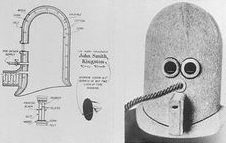
While it might have been a great device to help the wearer focus, it looked more like some kind of medieval torture device. The front of the device had an oxygen tube that was attached to a bottle of oxygen, so it was impossible to eat and study too. So, with no sound, no food, no way to play video games, the modern child would have no choice but to focus on homework. Now, I don’t know if the device could be locked in place…only to be removed when the work at hand was done, but if that is the case, I would think the wearer would get right to the task, so that the device could come off sooner. Just think of how much studying a college student could accomplish. Of course, my guess would be that even a person who was not claustrophobic before wearing the Isolator, would be claustrophobic after wearing it…not to mention a little paranoid, and leery of the person 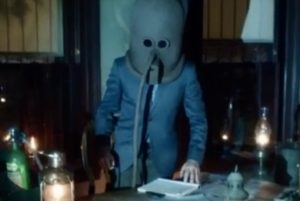 who made them wear the Isolator in the first place.
who made them wear the Isolator in the first place.
The Isolator never really caught on, and I think anyone can see why that might be, but I guess it might have been a good idea, had it not been so archaic and confining. Of course, that was only part of the problem. The wearer also looked ridiculous, and while they could be anonymously ridiculous looking in some places, it didn’t work that way at the office or in study hall, where everyone knew who was in the office or class. And, of course, it would be really creepy sitting next to someone who was wearing the Isolator. I think we will have to chalk this one up to a good idea gone crazy.

 After a spring filled with pneumonia for my husband, Bob and bronchitis for me, our annual hiking trip to the Black Hills of South Dakota was in question. Not the trip itself really, but the normal amount of hiking that we do, and the trails we normally take. We had determined that our favorite trail, up to Harney Peak was simply out of the question, and our early hikes were the Willow Creek trail, and two days on the Mickelson trail, both considered easy trails. We did exceptionally well, and so we decided that today would be a day for a moderate trail. We used the AllTrails app to make our decision, and settled on the Sunday Gulch trail, which takes off from Sylvan Lake.
After a spring filled with pneumonia for my husband, Bob and bronchitis for me, our annual hiking trip to the Black Hills of South Dakota was in question. Not the trip itself really, but the normal amount of hiking that we do, and the trails we normally take. We had determined that our favorite trail, up to Harney Peak was simply out of the question, and our early hikes were the Willow Creek trail, and two days on the Mickelson trail, both considered easy trails. We did exceptionally well, and so we decided that today would be a day for a moderate trail. We used the AllTrails app to make our decision, and settled on the Sunday Gulch trail, which takes off from Sylvan Lake.
When we got to the trailhead, the sign said that it was a strenuous trail that was four miles long and was expected to take two to three hours to complete. The trail’s rating made us hesitate, but we decided that if it got too rough, we would turn around and head back. We began the trail with a down hill hike across the rocks, with handrails to keep you from slipping. Yes…it was that difficult. My instincts said, “Maybe this isn’t such a good idea.” But, insanity won out, and we pressed on. The 
 trail was beautiful, and the air was cool down in the gulch, despite the 90° temperatures up above. We had started the hike early enough, and expected to be done by 11:30am. As we continued down, using several handrails to cross the difficult rocks, I just kept hoping that we didn’t have to go back up those rocks.
trail was beautiful, and the air was cool down in the gulch, despite the 90° temperatures up above. We had started the hike early enough, and expected to be done by 11:30am. As we continued down, using several handrails to cross the difficult rocks, I just kept hoping that we didn’t have to go back up those rocks.
After what we now know to be the last of the handrails, we came across the first people we would see. The were a young couple who told us the were beginning hikers. We asked if they had hiked this trail before. They had not, but they told us that the trail ahead was a gradual uphill hike…mostly anyway…with no handrails. My mind felt instant relief. It was short lived. Yes, the hike was a gradual uphill…some of the way, and no, there were no handrails. That doesn’t mean that the hike was easy. Granted we were not in the same shape we had been in years past, but I had hoped 
 that we were in better shape than it seemed we were. The 11:30am mark came and went, with us being apparently no closer to the end of the trail. We were close to the road at times, but there was no guarantee that it would be an easier hike. As we climbed I thought about two things. First, I had probably chosen a trail that was too hard for us. Second, that we were actually more that three quarters of the way through that trail, and while we were tired, we were making it. We were making it!! When we finally reached the end of the trail at 12:30pm, we felt a sense of pride in our accomplishment. We had broken through a barrier, and we made it back. It was the most strenuous, moderate trail we have ever hiked, but we did it, it was beautiful…and that’s what it’s all about.
that we were in better shape than it seemed we were. The 11:30am mark came and went, with us being apparently no closer to the end of the trail. We were close to the road at times, but there was no guarantee that it would be an easier hike. As we climbed I thought about two things. First, I had probably chosen a trail that was too hard for us. Second, that we were actually more that three quarters of the way through that trail, and while we were tired, we were making it. We were making it!! When we finally reached the end of the trail at 12:30pm, we felt a sense of pride in our accomplishment. We had broken through a barrier, and we made it back. It was the most strenuous, moderate trail we have ever hiked, but we did it, it was beautiful…and that’s what it’s all about.

